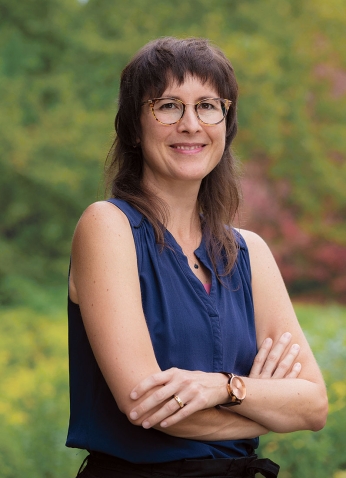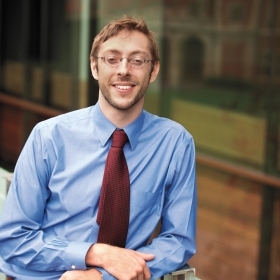Photo by Lisa Abitbol
Julie Walsh, associate professor of philosophy, is teaching Philosophy and Witchcraft for the seventh time this fall, and, as usual, she began with a caveat.
“On the first day, every time, I have to say, ‘You know, we’re not learning spells,’” she says. “I always give that disclaimer.” Walsh makes that clear because the first time she taught the class—not at Wellesley but at another institution—a couple of her students said how disappointed they were that they didn’t learn any “plain magic.”
Unlike a Hogwarts plain magic class, Walsh’s witchcraft offering is “a sneaky history of philosophy class,” she says. “It’s a way of using a really unusual moment in history to explore beliefs about causation, about standards of evidence, about gender, about evil.”
Walsh says studying witchcraft naturally brings up questions about historical and contemporary attitudes toward women. “I’m very interested in medieval conceptions of evil, but my heart is really in conceptions of womanhood,” she says. “Why were the vast, vast majority of people persecuted for this crime women? What was going on with respect to how women were understood, and excluded from certain places, and implicated in certain kinds of behaviors?”
The constellation of issues related to gender around the witch hunts is still present today, Walsh says: “While the witch hunts of early modern Europe and Massachusetts are a thing of the past, the beliefs that drove that violence are still with us today, and they drive violence today, but just in different forms.”
The class is popular with philosophy majors and non-majors alike, and its 25 seats always fill up quickly, Walsh says. She attributes that to a couple of things. First, witchcraft has been having quite a moment in pop culture and social media. “There’s a whole subgenre of TikTok called WitchTok, where self-identified practicing witches talk about their craft,” she says.
Second, there’s Salem, Mass. “Maybe the biggest draw of my class is that we go to Salem together in October,” Walsh says. (Last year, COVID restrictions prevented the trip. This fall, Walsh was hopeful about being able to make the trek.)
“Salem is a place of contradictions coming together all at once,” she says. “There are flashing lights and people dressed up, and then you also have the graveyard, and you have the memorial that the town erected to the people who were executed. There’s an interesting confluence of people making a living through the tourism aspect of it, and this really solemn memorial commemorating these really gruesome and senseless deaths.”
Walsh says contemporary issues often find their way into the discussion-based class. “In 2016, we talked a lot about the witch meme as it related to Hillary Rodham Clinton ’69 when she was running for president,” she says. “The course ends up taking on different dimensions depending on what’s going on in the world. This fall’s version will inevitably be informed by thinking about the pandemic. If something like COVID-19 had happened in 1690 in Salem, I think we could very confidently reconstruct what would have happened, and many more women would have been killed.”







We ask that those who engage in Wellesley magazine's online community act with honesty, integrity, and respect. (Remember the honor code, alums?) We reserve the right to remove comments by impersonators or comments that are not civil and relevant to the subject at hand. By posting here, you are permitting Wellesley magazine to edit and republish your comment in all media. Please remember that all posts are public.